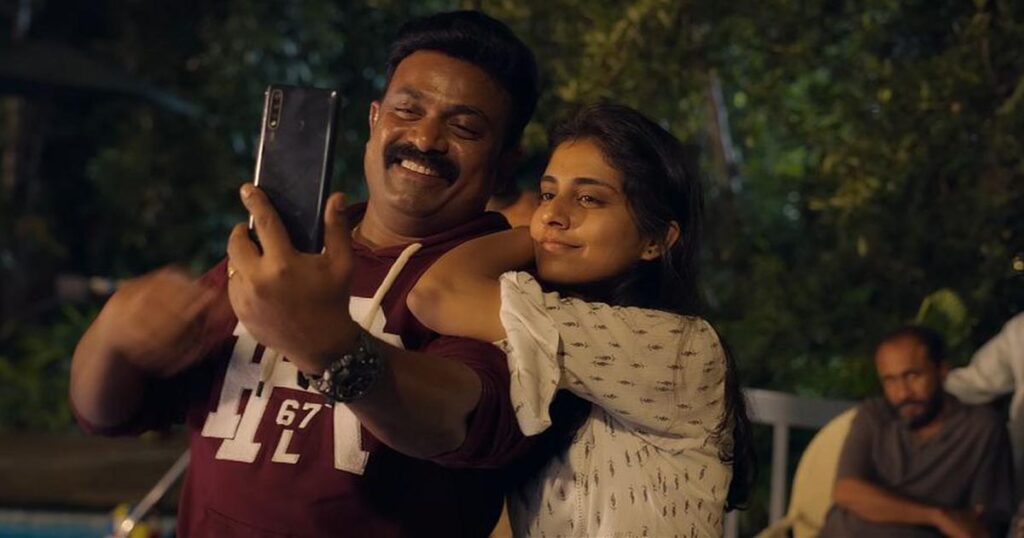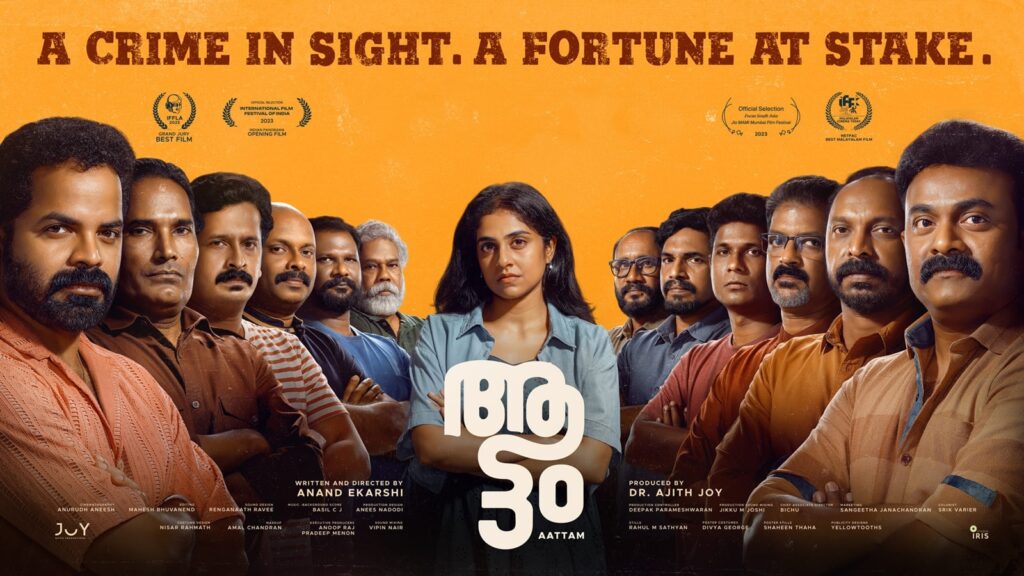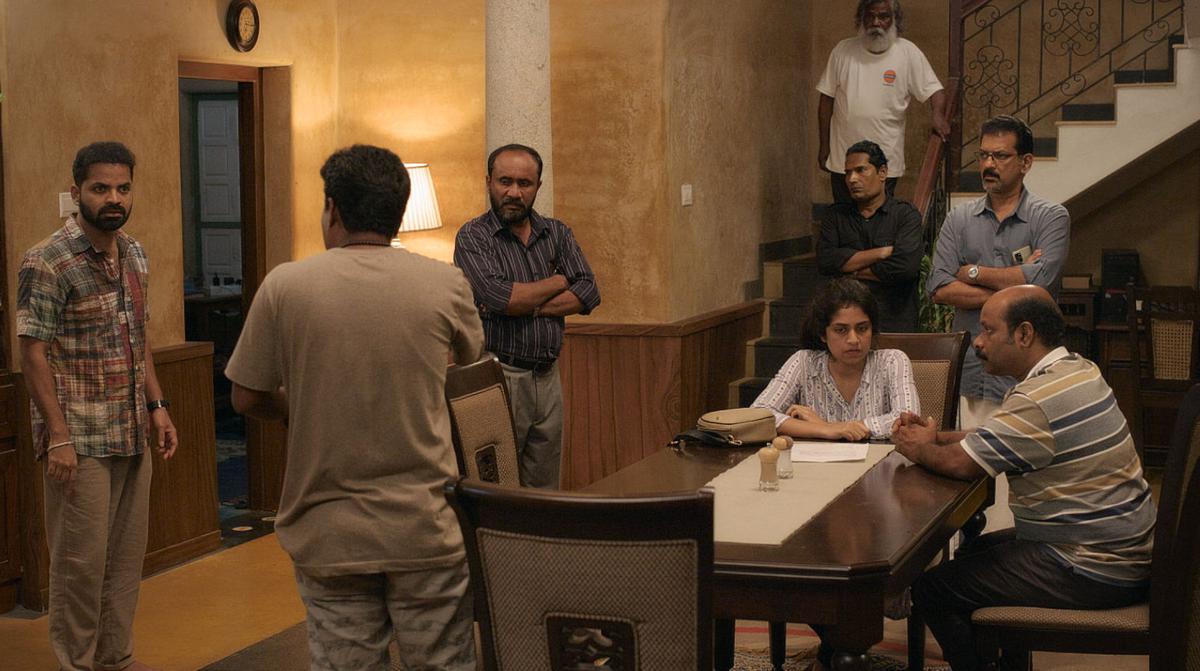After participating at various film festivals, Anand Ekarshi’s debut feature film, Aattam (The Play, 2023), is now available for streaming on Prime Video. It centers on a critical moment in the lives of 12 artists who have dedicated a significant portion of their careers to performing plays for a theatre troupe purely out of passion. Their harmonious camaraderie and existential pursuits face an unprecedented challenge when the sole female member of the team becomes a victim of sexual assault. As the plot unfolds, it delicately peels away the layers of each character, unveiling complexity imbued with both self-interest and compulsion. The characters’ actions and their decisions give rise to twists and turns in the tale, erupting from their insecurities and primal quest for survival. The chamber drama is tautly constructed, delving deep into the social, moral, and personal dimensions that define contemporary Indian society. The filmmaker throws us into a labyrinth of conflicting sympathies where our biases are challenged, compelling us to reassess our allegiances. By leveraging its meta-theatrical premise to question the essence of empathy and the roles we project onto others, the film elicits tension in the most mundane of exchanges. It explores how even progressive and liberal people can have latent parochial and misogynist tendencies. In doing so, it further beckons us to confront the shadows of our own biases and preconceptions about progress and equality in society.
Anjali (Zarin Shihab) is an interior designer who has been part of the theatre group Arangu since she was sixteen years old. She has eleven men in the troupe who are making a hand-to-mouth existence. One evening, the group performs a mythological play to rave reviews from the audience. The lead actor in the play Hari (Kalabhavan Shajohn), who had some success in the film industry playing antagonists, had invited his British friends to the play. Impressed by the performance, they graciously offered their villa in Fort Kochi to the participants to celebrate. Gathering at the lavish estate, the entire ensemble indulges in a night of merriment and soirée. A few days later, Anjali informs his close friend from the group Vinay (Vinay Forrt) that on the night of the revelry, Hari had groped her. Vinay immediately reaches Madan (Madan Babu), the coordinator, and informs him of the lustful act. Soon, a meeting with the rest of the team members, excluding Hari and Anjali, is held, and a letter is drafted to expel the culprit from the group. At the turn of an event, Hari comes up with a lucrative proposal that puts the integrity of all the members into question.

Aattam exudes a cinematic charm so effortlessly nuanced that one might not think of it as style at all. The characters behave with such elegant fervor that it creates a harmonious yet emotionally charged atmosphere, oscillating between the vagaries of existence and the deep desire to remain just. Moral ambiguity is at the epicenter of the drama, as characters are compelled as well as lured to make difficult decisions and grapple with complex ethical dilemmas. Hari joined the group two years ago and has been cast in the lead role previously held by Vinay. Due to Hari’s popularity as a film personality, the group has benefited, but Hari feels deprived of the position he deserves in the play. Therefore, Vinay’s plans to convince the members of the group to unanimously decide to expel Hari stem from his concern for Anjali. Or is he trying to take advantage of the situation? Vinay’s true intentions remain shrouded in uncertainty. When the members of the group discover that Hari has come up with a proposal that is akin to a once-in-a-lifetime kind of opportunity, the needle of their conscience shifts as materialistic concerts outweigh bringing fairness to a situation. At the same time, by permitting Hari to manipulate the situation, Anjali becomes partially culpable. Hence, the exploitative aspect of the movie serves its intended purpose.
Ekarshi demonstrates adeptness in capturing the nuances of intimate drama, from subtle glances to minor transgressions that corrode relationships. His expertise and artistry remain intact, avoiding extreme melodramatic contrivances. By skillfully orchestrating narrative elements, he ignites maximum conflict within the screenplay. He is far too skilled a dramatist to draw overly comparative similarities between Lumet’s 12 Angry Men (1957) and the story of the film. Instead, he utilizes the characters of his film as theatre actors to draw attention to the roles people assign themselves in everyday life.

The ensemble cast of the films delivered unity in their performances as we watched them navigate the intimate complexities of their decision and relationship with their female co-actor in their vague attempts to warrant their actions. Zarin Shihab as Anjali delivers a strong performance, bolstered by innate gallantry, a tensile strength of skill, and a keen sense of expressiveness. Vinay Forrt, as Vinay brings a seamless transition to his character from being a caring individual to an opportunist guy, is accomplished with his usual versatility. Kalabhavan Shahjohn, as Hari, is one of the most cryptic characters in the films. Whether noble or conniving, his intentions remain an enigma throughout the film.
The cinematography by Anurudh Aneesh weaves fluidly in and out of chambers and passageways and frames the characters with utmost precision to capture their turmoil. Mahesh Bhuvanend’s editing has an elegant freneticism that intensifies the tight and seemingly omnipresent pacing. The effective sound design by Renganaath Ravee sustains interest within the enclosed space of a hall and symbolic gestures with the thud of a coconut falling on a roof, the blinking noise of an inverter, and the noise of an oncoming storm.
Given the sensitivity of the issue, Exploring themes of abuse against women in cinema is a sensitive issue and presents significant challenges for filmmakers. Many films have addressed the topic and most have fallen into the trap of becoming wily and preachy, undermining the complexity of the subject matter. However, Aattam stands out through its compelling storytelling and confident direction. The film provides subdued moments with meaningful dialogue that is sincere and nuanced. It leaves a lasting impact and resonates with the viewer’s minds and hearts long after the credits roll.





